News
LDI 2017 Senior Fellows Kickoff Event Report
18 New Investigators Welcomed to Penn's Collaborative Hub of Health Services Research

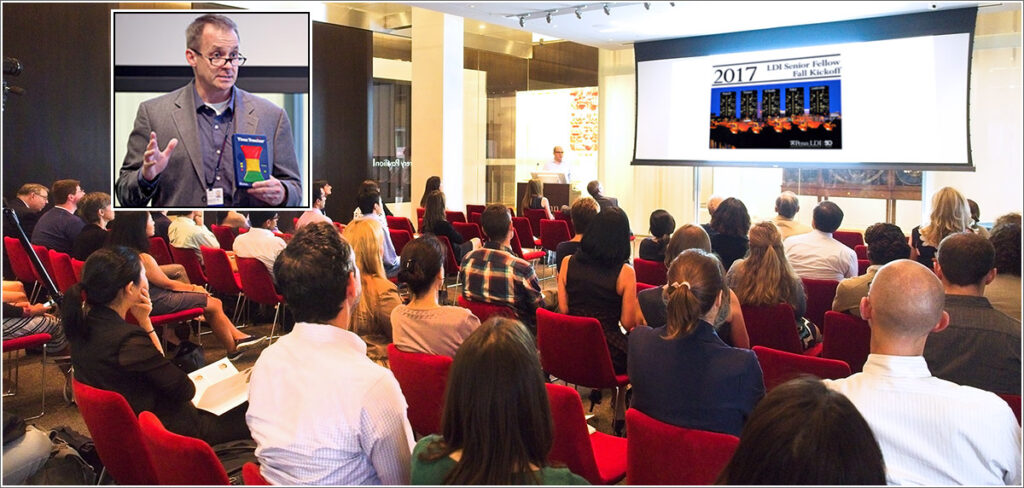
The 2017 Leonard Davis Institute of Health Economics (LDI) Senior Fellow Kickoff event was held in the Moelis Terrace of the University of Pennsylvania’s Van Pelt-Dietrich Library.
As one of the many ways LDI fosters and supports collaboration among its members, the annual LDI Kickoff introduces the year’s new Senior Fellows. Each is allotted four minutes for a speed-dating-like presentation about themselves, their work and their collaborative interests. In his welcoming address to the group, LDI Executive Director Daniel Polsky, PhD, emphasized how the gathering typifies the way LDI provides opportunities for researchers to interconnect across the broad community of investigators working to generate new knowledge about health and health care across Penn’s own campus as well as around the world. Managing the official and unforgiving time clock at this year’s event (inset, above) was Peter Groeneveld, MD, LDI’s Director of Research. A reception after the presentations enabled old and new Senior Fellows to meet and chat about their mutual interests. These are the 18 new Senior Fellows who presented:
~ ~ ~
Paula Chatterjee, MD, MPH
Physician and Post-doctoral Fellow, General Internal Medicine, Perelman School of Medicine

Safety Net Hospital Operations
A new arrival in Philadelphia, Paula Chatterjee spent the last seven years in Boston completing her clinical training in internal medicine at Brigham and Women’s Hospital and researching how U.S. safety net hospitals function and often thrive. “I’m interested in the issues that vulnerable populations face, particularly as they differ by rural and urban poverty as well as understanding what the role of patient choice is for these patients.” One of her immediate goals, besides acclimating herself to her new city, is to become “a conscientious Twitter academic.” | See bio page |
Aviv Nevo, PhD
Penn Integrates Knowledge Professor, Economics & Marketing, Penn School of Arts & Sciences and The Wharton School
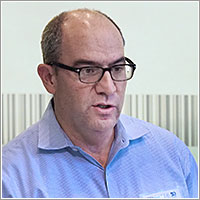
Health Care Industry Merger and Competition Policy
Former Chief Economist of the U.S. Department of Justice Antitrust Division and self-proclaimed barbecue fanatic Aviv Nevo is a national expert on health care industry competition and competition policy. His recent research is focused on consumer trends related to health, especially in the areas of tobacco and obesity. A current study is using U.S. migration data to analyze how consumption patterns changed for people who were born or grew up in geographic areas of high obesity areas and later moved to areas of low obesity. | See bio page
Holly Fernandez Lynch, JD, MBE
Assistant Professor, Medical Ethics and Health Policy, Perelman School of Medicine

Developing IRB Evaluation Metrics
A former Senior Policy and Research Analyst for President Obama’s Commission for the Study of Bioethics Issues, Holly Lynch’s current research focuses on the Institutional Review Boards (IRBs) that evaluate the ethics and protocols of biomedical and behavioral research involving human beings. “We’ve got a lot of data about burden and cost but we don’t have data on the other side,” she said. Her project hopes to measure “what IRB quality looks like” and develop evaluation metrics to further improve those processes’ quality. | See bio page |
Adriana Perez, PhD, ANP-BC, FAAN
Assistant Professor, Penn School of Nursing

The Built Environment, Health Disparities and Behavioral Incentives
Former Congressional Fellow and Arizona State University Southwest Borderlands Scholar Adriana Perez joined the Penn School of Nursing in 2015 and continues her research focus on elderly Latino communities. She maintains a clinical practice in North Philadelphia at the Mercy Life center and is seeking collaborators interested the impact of the built environment on community health, behavioral incentives and strategies that promote healthy lifestyles, and health disparities. | See bio page |
Ryan Greysen, MD, MHS, MA
Section Chief of Hospital Medicine, Division of General Internal Medicine, Perelman School of Medicine
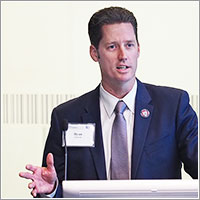
Get Thee From Thy Bed, Hospital Patients
The research of Ryan Greysen, Section Chief of Hospital Medicine in Penn Medicine’s Division of General Internal Medicine, is focused on the epidemic of hospital bed rest that is now known to be toxic to older adults. He is an advocate of dramatically increased hospital patient mobility and noted that, to their detriment, older patients spend an average of more than 23 hours a day in their hospital beds. “We’re trying to measure this to determine just how much mobility would prevent you from having a decline in the hospital,” he said. | See bio page |
Allison Hoffman, JD
Professor of Law, Penn Law School

Redefining What Long-term Care Risk Means
Health law specialist Allison Hoffman’s work analyzes how health insurance regulations and policy both reflect and shape our ideas about health risk and responsibility. She has looked at long-term care policy and argued that standard conceptualizations of social risk are too narrow in how they presume risk to be exclusively about the patient. Instead, she asks that the problem be defined from the perspective of the friends and family responsible for the patient’s care and that it be viewed as a co-equal risk for purposes of social policy and insurance design. She characterized these concepts as “recipient risk” vs. “next friend risk.” | See bio page |
Matthew Press, MD, MSc
Associate Medical Director, Penn Medicine Primary Care Service Line, Perelman School of Medicine
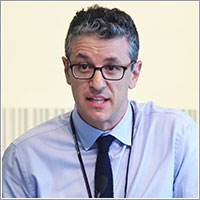
The Communication Tangles of Effective Patient Care Coordination
Matthew Press’ research focuses on how to create more efficient and effective systems of patient care coordination. He notes his own clinical experiences have shown him that the policy debates around this subject tend not to be well grounded in reality. To illustrate, he displayed a chart detailing 80-days of a single cancer patient’s care coordination during which he made 12 calls to the patient, 12 calls to clinicians, and sent 28 clinician emails during his patient’s 11 appointments and five procedures. | See bio page |
Norma Coe, PhD
Associate Professor, Medical Ethics and Health Policy, Perelman School of Medicine

Longitudinal Health and Retirement Study
Norma Coe, who focuses on the economics of aging, told the audience, “we are all interested in working together. My offer is that I have funding to set up a full time programmer to work on the Health and Retirement study, a survey that’s been going on every two years since 1992 for the age 50-and-over population. It’s linked to Medicare claims data and, as of last summer, it’s linked to Medicaid claims data. As far as I can tell, no one seems to be using it yet.” | See bio page |
Atul Gupta, PhD, MBA
Assistant Professor, Health Care Management, The Wharton School
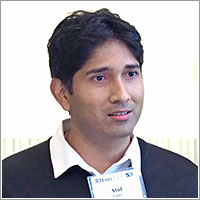
Analyzing the Effects of the Affordable Care Act
Atul Gupta’s fun fact was the 2016 study he did with MIT’s Amy Finkelstein and Stanford’s Liran Einav comparing the economic and actuarial trends of both the U.S. human and pet health care industries. “It was a project that received more attention than I’d like,” he said. He is also analyzing the ACA insurance expansions in California to see how they effected demand for care in general, demand for low value vs. high value care, and efficiency in terms of health outcomes. Another recent project evaluated the Medicare pay-for-performance incentives designed to decrease hospital admissions. | See bio page |
Eric Hume, MD
Director of Quality and Safety, Orthopaedic Surgery, Perelman School of Medicine

The Challenges of Bundled Orthopaedic Procedures
Comically alluding to the challenges of bundled payments, orthopedic surgeon Eric Hume projected an image from The Wizard of Oz on the screen. There was the lion, scarecrow, Dorothy and the tinman strolling down the yellow brick road arm-in-arm but Hume’s own face was photoshopped over Dorothy’s. “When we went into bundles,” he said, “I felt something like Dorothy who got whipped up into a tornado.” Hume also expressed interest in collaborating with audience members who work with Medicare data. | See bio page |
Emily Largent, PhD, JD, RN
Assistant Professor, Medical Ethics and Health Policy, Perelman School of Medicine

The Ethical and Regulatory Issues of Combining Clinical Research with Clinical Care
Emily Largent is an avid ultra marathoner who opened her presentation with a photograph of herself on the finish line of last year’s Keys100 100-mile race in Florida. At work she’s researching the implications of integrating clinical research in clinical care and is seeking collaborators. And she’d also love to get suggestions about Philadelphia area’s best running trails and races. | See bio page |
Karen Lasater, PhD, RN
Assistant Professor, Penn School of Nursing

Care Plans for Terminal Patients
Health outcomes and policy researcher Karen Lasater is currently investigating how to improve hospitals’ clinical environment in ways that positively impact patient outcomes in episodes of end-of-life care. She notes that “in the chaotic environment of hospitals, conversations about patient goals and values, as well as their clinical prognosis, are often sidelined in pursuit of more life sustaining treatments.” She said half of hospital nurses disagree with their physician colleagues about care plans for such patients. | See bio page |
Matthew McCoy, PhD
Assistant Professor, Medical Ethics and Health Policy, Perelman School of Medicine

The Politics of Autism Advocacy
Conflict-of-interest researcher Matthew McCoy notes that autism advocacy raises a lot of questions because “on one side you have autistic advocates who tend to be pretty high functioning, claiming to speak on behalf of people with autism and in many cases, they’ve been challenged by parents of children with more severe autism, saying ‘you’re not actually speaking for my child’,” he said. “This raises a lot of interesting political, philosophical and ethical issues about what it means to represent somebody in the politics around health care.” | See bio page |
Wallis Muhly, MD
Assistant Professor, Anthesiology and Critical Care, Perelman School of Medicine

Value-Based Recovery Protocol for Pediatric Surgery Patients
After years of training, CHOP pediatric anesthetist Wallis (Ty) Muhly recently achieved his goal of completing a “Half Ironman” triathalon before he turned 40. It happened in 2016 at the Atlantic City “Ironman 70.3” event — that number indicating the number of miles the racers swam, ran and cycled across. Back at work, Muhly heads a team developing a standardized, value-based recovery protocol for young surgery patients. He said he really didn’t know “what’s important to a family when they get surgery,” and is now focusing much of his research on that issue. | See bio page |
Hummy Song, PhD, MPP
Assistant Professor, Operations, Information and Decisions, The Wharton School

Operational Efficiency in Health Care Delivery Venues
Hummy Song’s fun fact is her unusual name. She said her musician parents wanted to create a unique moniker that would sound American to Koreans and Korean to Americans, but when she visits Korea, no one has a clue about where such a name came from. Song’s research is focused on investigating the daily operational details of health delivery venues like hospital emergency departments and home health care visits. Her goal is to understand their organizational efficiency and level of influence on patient outcomes. | See bio page |
Harsha Thirumurthy, PhD
Associate Professor, Medical Ethics and Health Policy, Perelman School of Medicine

Global Health and Behavioral Economics
Economist Harsha Thirmurthy came to Penn because of the strength of its reputation in health-related behavioral science and his goal is to help expand the global reach and efforts of the Center for Health Incentives and Behavioral Economics (CHIBE). He welcomed any collaborators interested in being part of that. Since 2003 he has been involved in research in Africa related to the access and implementation of HIV treatment made possible by the U.S. foreign aid programs. He has also been investigating the economic impact and outcomes of other diseases, like malaria. | See bio page |
Atheendar Venkataramani, MD, PhD
Assistant Professor, Medical Ethics and Health Policy, Perelman School of Medicine
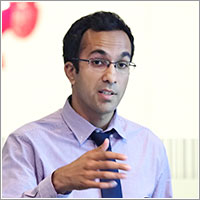
Parsing Out How Social and Health Inequities Evolve Over Time
Economist and physician Atheendar Venkataramani was born in State College, raised in Erie and became a diehard Steelers fan at the age of eight, which later put him in an emotional bind during the years of his medical residency in Boston. At Penn, much of his research is focused on studying life course events to understand how the social and health inequities that evolve over time might be mitigated by interventions that, he said, “ensure that a healthy start actually IS a healthy start” for growing children. | See bio page |
Zuleyha Cidav, PhD
Research Assistant Professor, Center for Mental Health Services in Psychiatry & Services Research, Perelman School of Medicine

Evaluating Access, Utilization and Costs
At the Center for Mental Health Policy and Services Research, Zuleyha Cidav’s interests focus on the application of economic analysis to health policy and practice; planning and evaluationg health services, programs, and interventions; and understanding the impact of health policy and practice on access, utilization and costs of health care services. Her recent projects include healthy minds/healthy kids integrated care programs, evaluation of telehealth services for cancer survivors, Medicaid’s insurance mandate for autism patients and the evaluation of asthma management programs. | See bio page |







